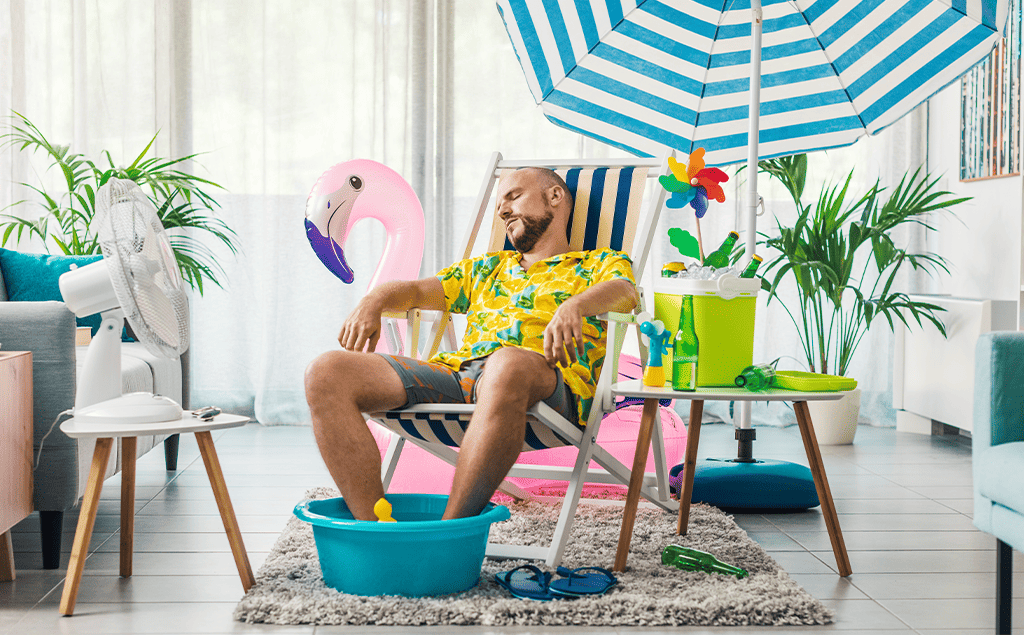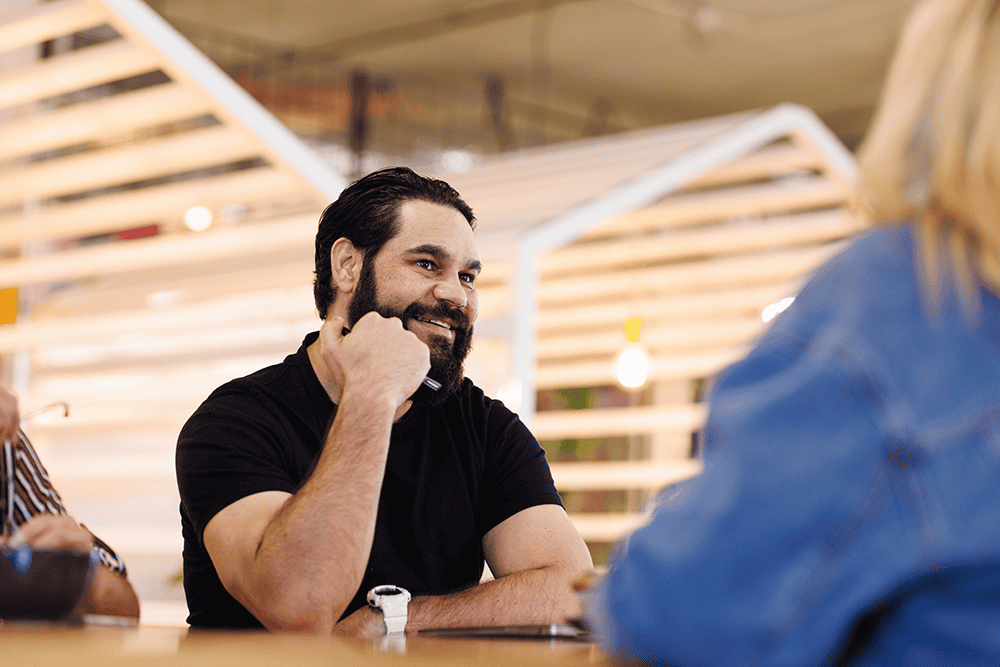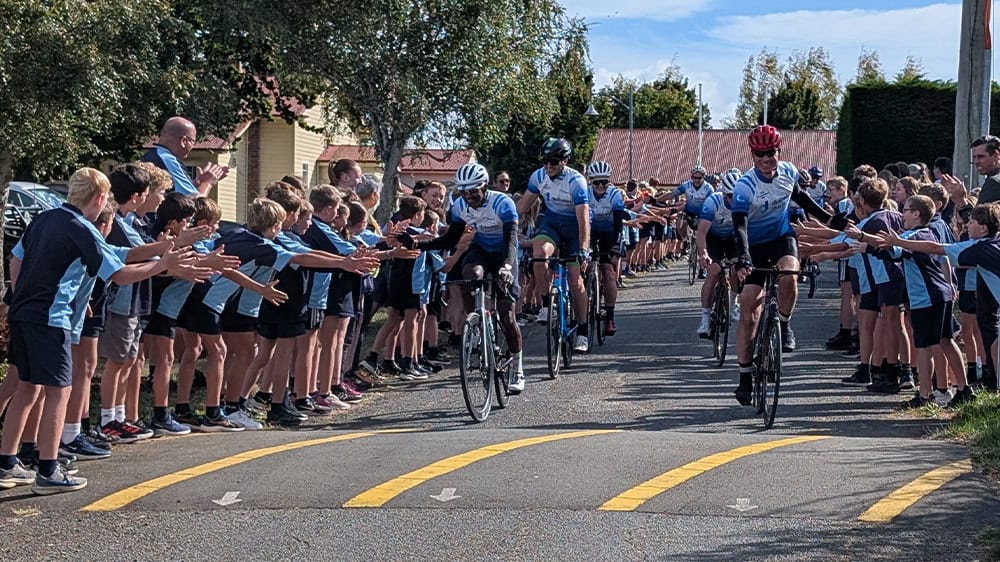Those sleepless summer nights
We welcome the season of vacations and beach days. Unfortunately for some, this time of year also triggers sleep difficulties. This article lists several ways to encourage sleep onset and maintenance through the night so you can awake refreshed and ready for your next holiday adventure.
The sleeplessness challenge
I think we can all relate to Geoff Dyer when he said:
“It was so hot we spent our waking hours dozing and our sleeping hours lying awake, trying to sleep.”
Many of us look forward to the long, lazy summer days. But for others, the rise in temperature and lengthening hours of sunshine are a challenge to both the quality and quantity of their sleep.
Research shows long-term sleep deprivation reduces our attention depth and span as well as patience with loved ones. It also increases our stress and anxiety, and negatively affects memory.
Why is getting good quality sleep so hard in summer?
Hormones
The hormone melatonin is only excreted at nighttime. Its job is to send us off to sleep. The onset of darkness triggers this release, and the length of secretion is determined by the number of dark hours versus light we experience. Seasonal length of darkness, known as the scotoperiod, varies between summer and winter. So, less melatonin is released due to the shorter number of dark hours over the summer period. Light also includes artificial light in our homes and workspaces.
Temperature
Research conducted by the Sleep Health Foundation found the perfect sleeping temperature was roughly 17-19°C. Many places in Australia exceed this as a minimum overnight temperature. We may also experience humidity as well.
Social activity
Some of us like to be out and about with friends and family more in the hotter weather. The late nights, interruption to regular routines, food and alcohol choices, may all affect our sleep patterns.
How can we sleep better in the heat?
The term ‘sleep hygiene’ describes the healthy habits, behaviours and environmental factors that can be modified to help with achieving a good night’s sleep. Let’s look at some of them here.
- Dietary choices: We neither want to be uncomfortably full or tummy-grumbling hungry when retiring for the night. Consuming spicy or heavy food can induce stomach acidity and reflux, worse when lying down. A chat to an accredited practicing dietitian can point you in the right direction for how to manage food choices effectively.
- Alcohol: This one is interesting. The sedative effects of alcohol can assist with relaxation and sleep onset; however, after three to four hours it creates an imbalance between slow-wave sleep and REM sleep leading to more interrupted sleep cycles and poorer sleep quality overall.
- Caffeine: Some of us are highly sensitive to the stimulating effects of caffeine while others appear immune. It may allow us to stay up later and sleep less hours overall as it blocks adenosine receptors in the brain. This sleep-inducing chemical builds up over the waking hours and blocking its effects may disrupt sleep. If you believe caffeine intake is reducing your sleep quality, experiment with drinking, especially later in the day.
- Hydration: Dehydration is common in the summer months as we sweat more, especially during physical activity, and may not remember to boost the intake of fluids. Some of the side effects of being dehydrated may affect peaceful sleep such as headache, dry mouth and muscle cramps. However, being overly hydrated can also interrupt sleep patterns if you need to get up several times overnight to go to the bathroom.
- Day time napping: This is very individual. According to the Sleep Foundation, for some, a 20 to 90 minute sleep, is just the ticket for refreshing the mind and body to enjoy the rest of the day. For others it leads to restlessness and fractured nighttime sleep, or even insomnia. They recommend each person monitor daytime energy levels and sleep patterns to determine what’s right for you.
- Polysomnography: Also known as a sleep study will reveal any sleep disorders affecting the duration and quality of your sleep. This can be discussed with your GP.
- Body movement: Moderate aerobic exercise increases the amount of rejuvenating, slow wave sleep we experience at nighttime. The happy hormones released during physical activity also moderate mood and relaxation. However ongoing studies are questioning the stimulating effects of late-night exercise on our ability to get to sleep. So at this time physical activity is recommended for the earlier parts of the day. If you have an injury or physical pain a Physiotherapist might be worth a visit. Or if you are wanting an exercise plan designed specifically for you an Accredited Exercise Physiologist can help you with this. The NDSS programs Ready Set Go Let’s Move and Beat It are designed to promote your entering or re-entering physical movement. Please see your GP for advice before starting any new physical activity regimen.
- Light: We want to assist the production of melatonin, the sleep hormone mentioned above. The best way to achieve this is to manage the light in our sleeping areas. This can be achieved with block out curtains, an eye mask or ensuring our devices and electrical appliances are not shedding unnecessary light into the bedroom. Can we switch off some items like TVs or computers overnight?
- Noise: Research shows we become somewhat immune to background noise such as a busy street. However, if this is affecting your sleep, you may want to invest in ear plugs. Try turning off noisy appliances or moving them out of the bedroom if possible. Can you shut the door between you and the buzzing fridge? Is there an app with ambient noise or relaxing music? Whales singing or Enigma anyone?
- Temperature: Reducing room temperature may be achieved by: air conditioning or an open window. Movement of air over the skin by cross ventilation or a fan reduces body temperature. Cooling items such as a cold washcloth or spritz bottle on the forehead, hands, inner elbows or neck, and even freezing your pillowcase are all ideas to try. Let’s also consider wearing lighter weight pjs and making the bed with thinner textured sheets.
- Screen time: Research shows two or more hours of evening screen time reduces the release of melatonin. It also challenges our ability to get to sleep if we are watching action movies or using exciting computer games or apps as these release adrenalin into our systems. The blue light emitted from screens of TVs, computers and smartphones has the largest effect of all colours on circadian rhythms, stimulating the brain and making us feel alert, the opposite of what we need if attempting sleep. Recommendations to complete screen time before bed range from one to three hours.
- Relaxing the mind: Relaxation, visualisation, meditation and breathing exercises aim to lower the heart rate and blood pressure and deepen and slow down the rhythm of breathing. This encourages our bodies to release relaxing and sleep-inducing hormones. There are phone apps, websites, books, and online peer groups to develop these skills.
- Reading: many of us find reading a relaxing activity. But no crime thrillers if you want to relax the mind. Try re-reading a book you’ve read before, so you won’t be stimulated to flip pages long into wee hours.
- Gratitude: Focusing on what is going right in your world may distract from areas of concern which are keeping you up at night; the ‘broken record syndrome’. Try concentrating on a nice person and what they mean to you, the last, happy time you were with friends or family or a relaxing day in nature.
- Relaxing the body: Gentle stretching, yoga or progressive muscle tensing and relaxing exercises improve sleep onset and duration.
- Sharing: Friends and family are wonderful supports for many of us. Sometimes though, speaking to a professional may be preferred. If stress, including diabetes distress, is affecting your sleep, you may consult your GP about a Mental Health Plan which provides ten subsidised visits to a Psychologist.
- Circadian rhythms: Our sleep hormones love routine. Whatever nighttime before bed rituals you prefer, try to stick to a set order. This might involve setting an alarm at a certain time, a cool shower, then a herbal tea such as chamomile or lavender, (checking with your pharmacist or GP about any interactions with your medications), putting on your pjs and opening your book once in bed.
- Medications: When was the last time you had a medication review? You may be experiencing medication side effects disturbing your sleep. Book a GP appointment to discuss.
- GP: As well as the many ways mentioned above, your GP may also recommend a referral to allied health professionals on a Chronic Disease GP Management Plan and Team Care Arrangement. You may know this as a Care Plan. Or order pathology screening he or she feels may reveal factors affecting your sleep. Your GP should be your first port of call to discuss any sleep issues.
Diabetes Australia resources
Diabetes Australia offers PDF factsheets you can download and print out as well as The Diabetes Shop, recipes, support groups, leadership programs and Aboriginal and Torres Strait Islander resources.
NDSS resources
The National Diabetes Services Scheme have many and varied resources on their website. Here are some links.
By Constance Russell, Registered Nurse, Credentialled Diabetes Educator




